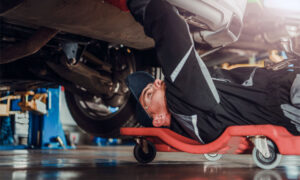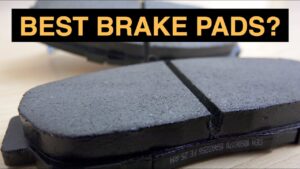Does your car vibrate when you accelerate it? Does it vibrate only when you are at a low speed or a high speed? When you face these kinds of problems in your car, your car is warning you of a problem that is not much critical now but could turn into a big one if not looked after immediately. So, let us discuss the problem of why a car vibrates when accelerating from a stop and look for its solutions.
Car vibrating when accelerating is a warning sign that might turn into a big problem if not looked after immediately. There are two circumstances or situations when your car vibrates, carefully observe these, and read the solution given. The first situation is when your car vibrates when accelerating from a stop and the second is when you are stopping the car. So let us discuss both the circumstances and look for its solutions.
Table of Contents
Fix Car Vibrates When Accelerating From Stop
We will discuss here both the situations mentioned that cause car wobbles at low speed or while stopping it. So, let us start.
1. Check The Engine
The most common reason for your car to vibrate at low or high speeds is engine problems. It may be due to the engine being deficient in the air or fuel making it incapable to work efficiently. Another reason for your car to shake or vibrate is when the air or oil filters are clogged. This will not provide the engine with a sufficient amount of fuel or air. You should also check the spark plugs and see if the wirings are in good condition and placed correctly.
How To Fix It?
If the filters are damaged, you could replace them yourself by buying them at local stores or online. Check the wirings of the spark plug and see if any of them needs to be replaced. Check out the video provided below for more help.
2. Check The CV Joints
The CV Joints are located near the axle and any damage to them could be the cause for your car to vibrate when accelerating. These can be damaged externally by any collision with the ground or even due to wear and tear. These should be fixed as soon as possible because they could get more damaged with the time which might lead you to spend more money and time.
How To Fix It?
The CV Joints are quite sensitive parts of the car and should be handled by a professional only. You could try to look for any damage to them near the axle joint to be sure if this is the case.
3. Check The Brakes
If you find that your car is vibrating or shaking only when you apply the brakes, this suggests that there might be a problem with the braking system of your car. The problem is mostly due to damage to the brake rotors. The brake rotors are circular discs connected to each wheel. They create friction when the brake pads squeeze together and help in the stopping of the car. Brake rotors are specifically designed to convert the kinetic energy of the wheels into heat energy. Overheating and external damage to them would make your car vibrate when you apply the brakes.
How To Fix It?
The rotor discs should be uniformly flat. If there is any deformation, the grip on the brake pads would be uneven and your car will vibrate when you apply brakes. Get your brakes checked by a mechanic as soon as possible to avoid more damage.
4. Check For Unbalanced Wheel Alignment
Unbalanced wheel alignment could be a major cause for your car to vibrate. One or more of the wheels could be unbalanced concerning others and put a lot of pressure on them. This could seriously damage the wheels of your car and could even lead to an accident. So, get your wheel alignment check as soon as possible.
How To Fix It?
Get your wheel alignment checked to fix this problem. Remember, unbalanced wheel alignment puts a lot of pressure on one or more tire and cause them to rub more against the ground, reducing the diameter. So, get it checked immediately.
5. Worn Out Tires
Worn-out tires may be one of the causes that make your car vibrate when driving. Tires due to continuous friction with the road get worn out and after certain years, may get so bad, that they may get deformed and even the diameter of the tire may get reduced. Therefore, misaligning the tires and getting more damaged.
How To Fix It?
If you find that the tires have worn out, they need to be replaced as soon as possible. Driving with old tires is not safe because apart from misaligning the system, they also do not have a firm grip to avoid slipping. Therefore, replace old tires now.
6. Bent Axle
If you recently had a minor collapse of the under part of your car with a speed breaker or anything, this might have bent the axle of your car, making it vibrate and shake while driving. This could cause more damage to the whole alignment with time, therefore get it fixed as early as possible.
How To Fix It?
If the vibration started just after you had the accident, then you might consider that a bent axle is the one causing the problem. Get your car to a mechanic and let him handle it. You might also need to replace it in case the axle is damaged severely.
7. Loose Nuts On The Wheel Plate
Nutlugs are the ones that keep your tires fixed on the wheel plate. You could imagine the situation of them being loose. Firstly, the tires will vibrate for some time, and eventually may runoff from a moving vehicle. This could be dangerous for you as well as the other fellow drivers around you.
How To Fix It?
Checking the nut lugs and tightening them is the solution. Also, get your car serviced regularly to avoid such problems.
What Causes A Car To Vibrate When Accelerating?
When the inner CV joint is damaged or starts to fail, you will notice your vehicle vibrating under hard acceleration. As it gets worse, the slight vibrations turn to severe shaking when under load. Damaged constant velocity joints usually occur due to a tear in the joint boot.
How Do You Fix A Car That Vibrates When Starting?
The best way to reduce vibrations due to damaged engine mounts is to replace them. Worn engine mounts lead to vibrations, noises, and the “rocky start,” manifested through a lurch when starting the vehicle or turning the ignition off.
Why Does My Steering Wheel Shake When Accelerating?
When the vehicle is out of alignment, you may notice that the tires wear unevenly, leading to steering wheel vibrations and other issues resulting in an unpleasant drive. If your steering wheel shakes when accelerating, it means a front tire is out of balance.
Why Does My Car Shake When I Press The Gas Pedal?
If your automobile feels like it is vibrating from the motor area, it could be due to your vehicle not getting enough spark, fuel, or air to smoothly run. Therefore, your car’s shaking will increase when you try to accelerate or press down on the gas pedal.
What Causes Low-Speed Vibration?
Final Words
We have discussed in this article all the possible reasons that make your car vibrate when accelerating and have looked at the solutions to it. As mentioned earlier, car vibrations are generally a warning sign that if not looked after early may cause serious damage to your car. Therefore, do not overlook the vibrations in your car and get it fixed immediately.
If you like this article or have any queries related to our car vibrating when accelerating from the stop article, let us know in the comment section below.
Cheers!



